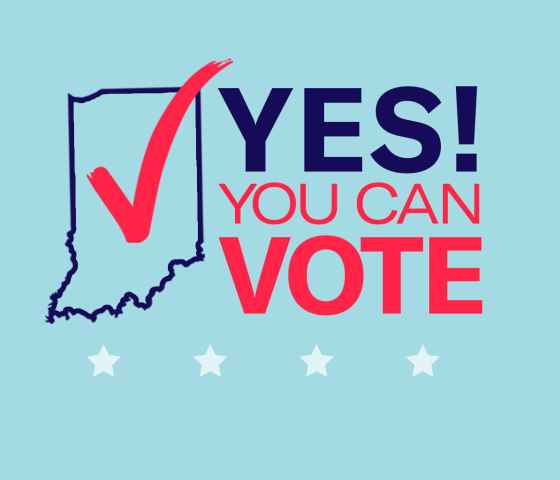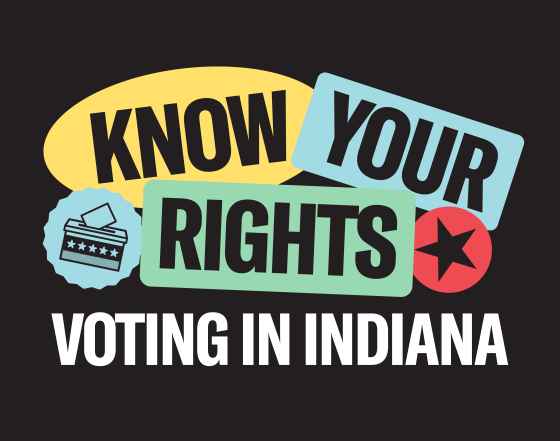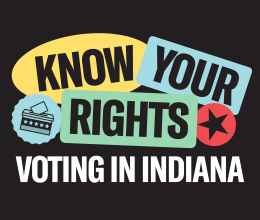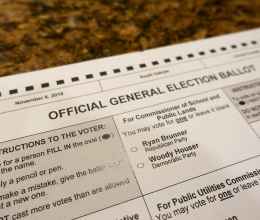It’s that time of year again, when Hoosier voters have the opportunity to hold elected officials accountable at the ballot box. To do that, the ACLU of Indiana urges Hoosiers to become informed about what elected positions are on the ballot, and who is running. Being informed about how municipal offices and positions impact your community, is a key first step to exercising your right to vote. Indiana’s Municipal Election Day, is Tuesday, November 7, 2023. Exercise your right to vote and hold your government officials accountable for decisions and actions they take throughout the year.
Below is a guide on what municipal offices might be on your ballot, what they do, and how it impacts local Hoosiers.
Mayor
An Indiana Mayor is an elected city or town chief executive. They have the duty to oversee the city, town, or county government's various departments, agencies, and municipal corporations. Elections have party affiliations listed on the ballot. They serve a four-year term and have no limit to the number of terms that they can be re-elected.
Mayors represent and speak for the people who live in their city or town. Depending on the city’s or town’s charter they may do the following activities and more:
- Sign (approve) or veto (reject) local laws passed by the City, Town, or County Council. This may include local ordinances that impact citizens’ rights
- Ensure the local laws of the city or town and the statutes of the state are being followed.
- Share information about the city’s or town’s finances and condition with the local government at least once a year.
- Gives recommendations on what the legislative body should do.
- Call special meetings of the legislative body when necessary.
- Manage important documents and licenses for the city and ensure efficient government of the city or town.
The mayor’s responsibilities directly impact Hoosiers' daily lives by shaping the city's community, infrastructure, taxes, and essential services. Their decisions influence the quality of life and the overall well-being of the community.
City Council
An Indiana City Council, Town Council or Common Council is a local government board that makes executive, legislative, and financial decisions for the city or town. They manage concerns about taxes, budgets, and laws. The number of council members may depend on how many people live in the area and the division of districts. They serve for four years and under Indiana law can run for re-election as many times as the city or town charter allows.
Councils may typically be responsible for these activities or more:
- Create or change local laws (known as ordinances), resolutions, orders, and motions.
- Collect taxes, adopt, or change a city or town budget, and distribute funds for city or town operation. This includes budgeting for police departments.
- Select members to certain boards and commissions.
- Adjust the city’s or town’s charter.
When a new local law is proposed, it goes to the Council for discussion. Citizens can voice their opinions during public meetings. After public input, the Council decides to approve or reject the law. If approved, it is sent to the mayor for approval or veto, though the Council may still pass it with a majority vote.
These responsibilities affect Hoosiers' daily lives by making critical decisions on local taxes, budgets for vital services, and laws.
City Clerk
An Indiana City or Town Clerk is an elected official who is responsible for official city record and serves a four-year term and can serve unlimited terms. They may appoint deputies to help them as needed and they decide their own annual compensation with the approval of the Council. The City Clerk's office is audited separately by the State Board of Accounts to ensure proper organization.
Depending on the city’s or town’s charter they may do the following activities and more:
- Record and oversee legislative processes by the City, Town, or County Council.
- Prepare agendas and schedule official Council and public meetings.
- Publish, update, and distribute city code of ordinances.
- Collect fines for breaking local laws.
- Send money to the correct government agency each month.
A City, Town, or County Clerk impacts Hoosiers' daily lives by ensuring a well-organized and responsive local government that leads to timely decisions on critical issues affecting the community. Accurate records and efficient handling of fines and finances lead to transparent governance, fostering trust and accountability.
Clerk-Treasurer
A City, Town, or County Clerk-Treasurer keeps records and minutes at meetings for the municipality such as the Council or other boards. They manage payroll, issue licenses and permits, manage town ordinances, and maintain town records. They also provide information to the public about town government, departments, and services.
Depending on the city’s or town’s charter they may do the following activities and more:
- The overall collection and disbursement of funds.
- Management of the accounting system.
- Signing of checks or warrants.
- Preparation of periodic reports.
- Serve as a resource for financial planning, budgeting and project planning with the City or Town Council.
A City, Town, or County Clerk-Treasurer directly affects Hoosiers' daily lives by ensuring accurate records, efficient fiscal management, and vital information about the town. They manage payroll, licenses, and town ordinances, contributing to transparent and well-organized local governance.
Judge
Municipal judges, who conduct over city or town courts, handle cases related to minor criminal offenses, traffic tickets, and violations of local laws. The judges in local courthouses serve 6-year terms, but how they earn their seat on the bench varies depending on county. A city court judge may not receive any fees or compensation other than the judge's salary, as established by the city fiscal body.
Depending on the city’s or town’s charter they may do the following activities and more:
- Make decisions over all violations of the ordinances of the city, misdemeanors and all infractions, and all other ordinance violations described in an interlocal agreement.
- Administer oaths and establish rules for the court's proceedings.
- Request witnesses.
- Enforce orders.
- Issue commissions for depositions.
A city court usually holds more jurisdiction than a town court. The subject matter of a city or town judge is limited so that the ordinary city court does not have jurisdiction in actions for slander, libel, mortgage foreclosures, probate matters, guardians, or actions in equity.
City or town judges have a significant impact on Hoosiers' lives. They establish a precedent for how cases are handled locally, setting future precedent. Their decisions can lead to consequences like changes in driving records, fines, and potential penalties, significantly impacting the criminal legal system.








